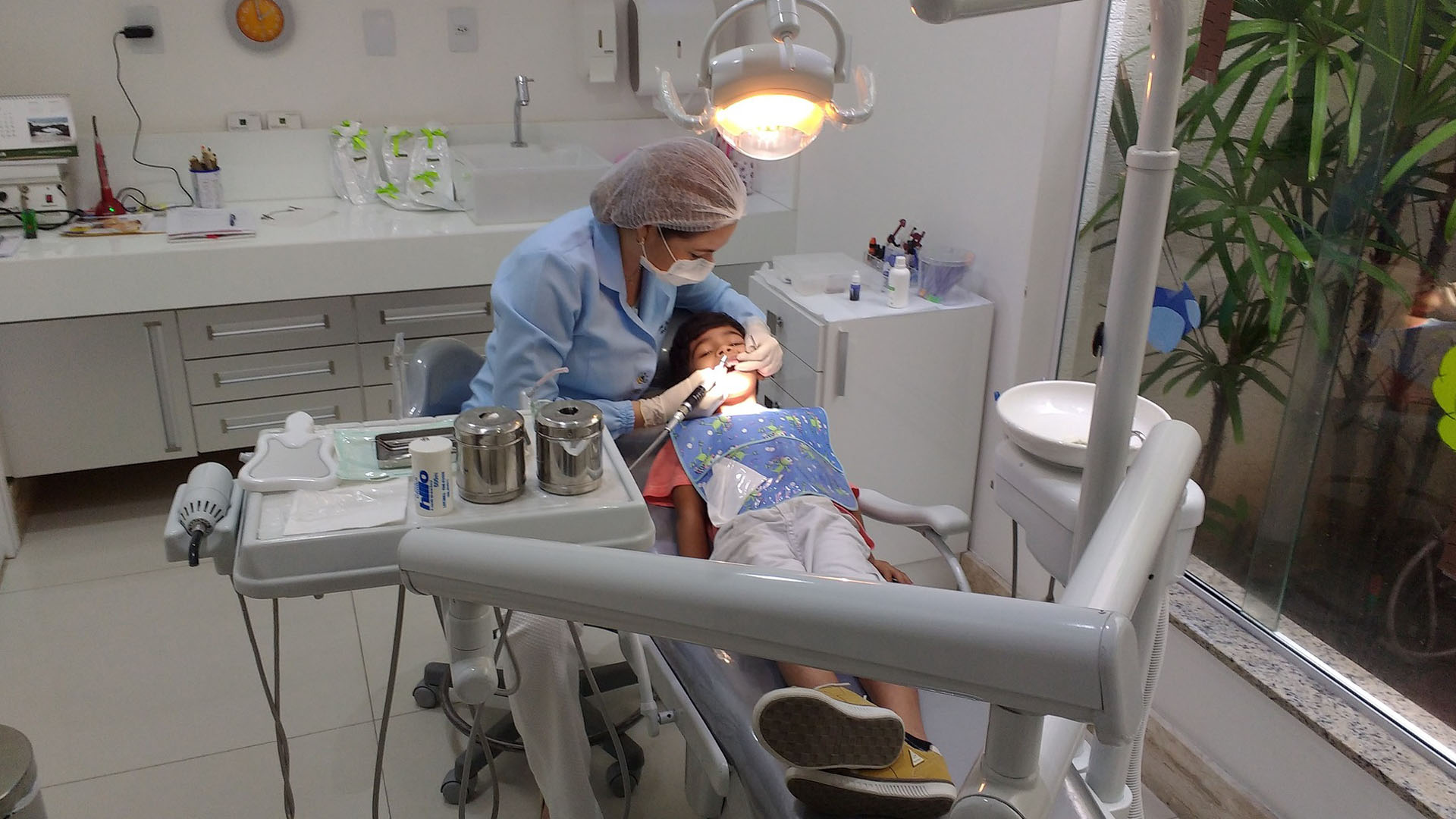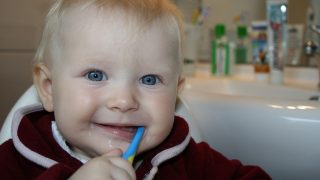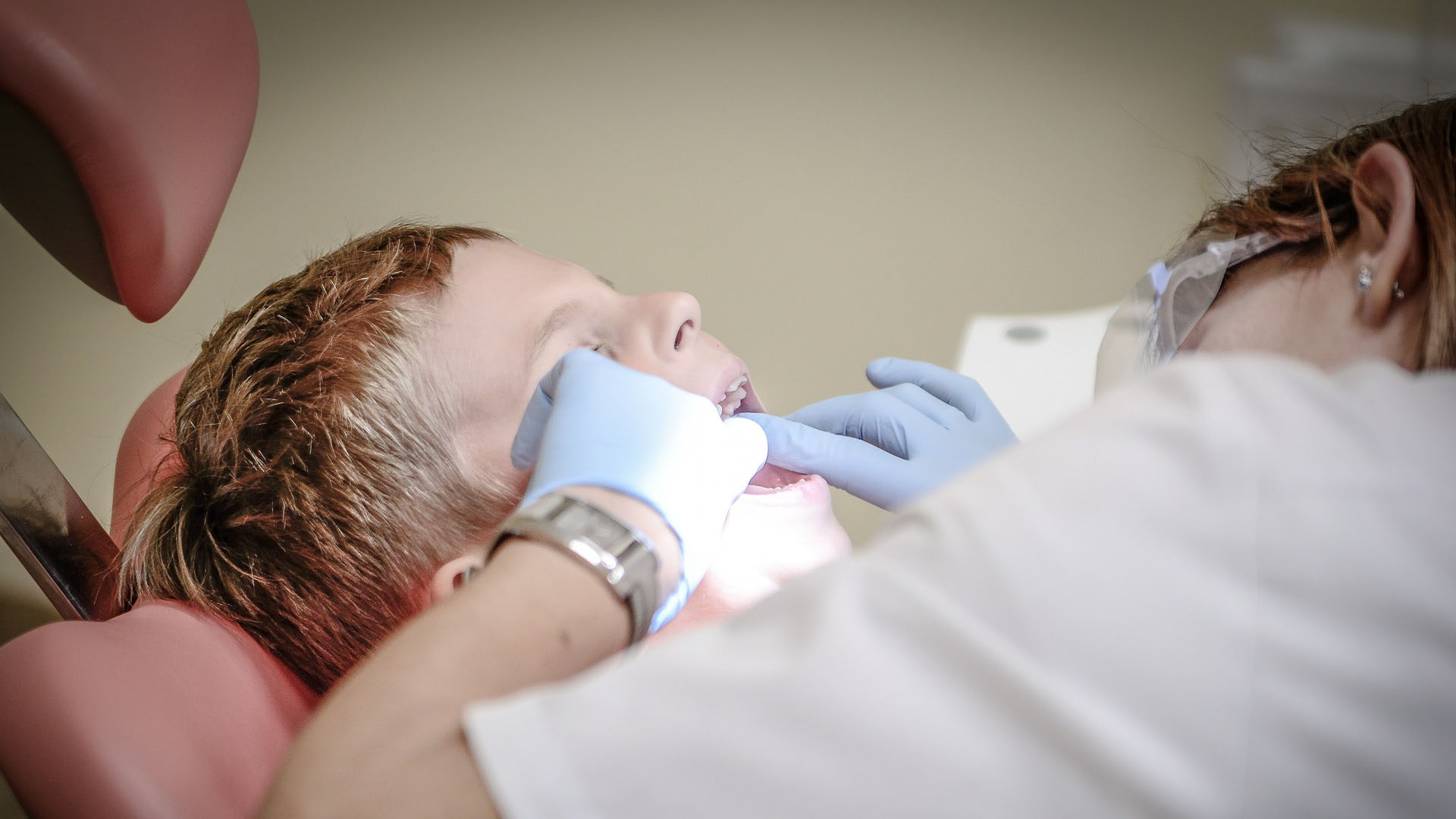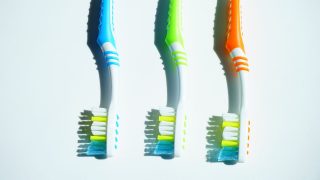By Katie Carpenter

The health of our mouth is incredibly important to our whole-body health. And there are some easy practices that we can help our kids to adopt now to prevent bigger problems from starting down the road.
February is Children’s Dental Health Month, a great time to brush up on ways to keep your little ones’ smiles healthy! And here to help us is local pediatric dentist, Dr. Nathaniel Cook, Director of Pediatrics at Apple Tree Dental. Dr. Cook shares answers to our questions about children’s dental health in the Q & A below.
Why is it important for kids to regularly see a dentist?
The health of our mouths is a big factor in our whole-body health. If our mouth is unhealthy, it can lead to issues with other parts of our body as well. Dental decay is the top chronic infectious disease in children – even more common than asthma and obesity. Tooth decay and oral disease can cause bigger problems, leading to pain, lack of sleep, worse nutrition, and poor focus in school and missed time in school.
Thankfully, many of the issues related to our mouth/oral health are preventable. If a child sees a dentist when their first tooth comes in or by age 1-year, and continues to see a dentist on a regular basis (recommended every 6 months), we can help educate families, prevent problems, and detect issues early before they become much bigger problems. We also help the child become more comfortable in the dental clinic environment.
What is the difference between a general dentist and a pediatric dentist?
A pediatric dentist is a dentist with 2-3 years of specialized training to be an expert in working with and meeting the needs of infants, children, adolescents, and patients with special needs. They are trained in the growth and development of children, understanding and guiding a patient’s behavior so treatment can be completed safely, treating baby teeth and adult teeth, addressing dental trauma, advanced behavior guidance techniques like sedation and hospital treatment, and simply making dental visits more positive for children.

What is the most common issue that you see in your practice? What can be done to prevent this?
The most common issue I encounter is severe dental decay in very young children that likely could have been prevented. The best way to prevent this is for parents to bring their child to a dentist (preferably a pediatric dentist, if available) at the time of their child’s first baby tooth, or by age 1. This way, the family can work with the dentist to identify possible issues early and learn simple ways they can prevent cavities, and if appropriate, have a preventive fluoride varnish applied to the child’s teeth. Dental decay in young children is often related to early exposure to the decay-causing bacteria (often transferred by the parent to the child), and frequent drinking of sugar-containing drinks – even drinks that seem healthy like 100% fruit juice, sports drinks, or milk.
Are there any myths about children’s dentistry that you can help to debunk?
For many years, dental professionals recommended bringing a child for their first dental visit at age 3, when most of their baby teeth are in. Unfortunately, by that time, many children already have tooth decay that could have been prevented if the child had been seen sooner.
 Many people assume that baby teeth are not important, but most children keep many baby teeth until they are around 10-12 years old. These teeth help with smiling, chewing, and talking, and are also important for helping the permanent teeth come into the correct position. Problems in the baby teeth can result in problems in the permanent teeth as well.
Many people assume that baby teeth are not important, but most children keep many baby teeth until they are around 10-12 years old. These teeth help with smiling, chewing, and talking, and are also important for helping the permanent teeth come into the correct position. Problems in the baby teeth can result in problems in the permanent teeth as well.
What is the best piece of advice you can offer to parents and caregivers to keep their kids’ teeth healthy?
1) Establish a “dental home” for the child by age one. A dental home is the ongoing relationship between a patient family and a dentist, and includes all aspects of oral health delivered in a family-centered way.
2) Help the child with their oral hygiene, with brushing twice daily with a toothpaste that contains fluoride. Floss their teeth once each day the teeth start touching. The most important time to focus on oral hygiene is before bed.
3) Limit frequency of sweets, beverages containing sugar, and snack-foods
Do you have any advice for parents bringing their young child to their first dental visit?
Parents often worry about how their child will behave at the dentist. Sometimes, they try to be helpful by “preparing” the child for dental treatment by talking about unpleasant parts of dentistry (such as getting a shot!), or using words like “owee” or “hurt”. Although this preparation is well intended, it can actually be counter-productive and make the child more nervous and fearful. It is helpful if parents can be encouraging and positive about the dental experience prior to the visit and keep explanations simple like “we’re going to see the dentist and they are going to count your teeth and help make them healthy”.

Is being a pediatric dentist rewarding for you? If so, how?
Absolutely! I love working with parents and caregivers to understand the unique needs of their child, and making it a positive experience for them and their child. I especially enjoy working with children with special needs. It is a delight to see the child over time as they continue to grow and gain confidence at dental visits.
Is there anything else that you’d like to share or help families to focus on this Children’s Dental Health Month?
The oral health of parents plays a big impact on the oral health of their children. The bacteria that cause oral disease like cavities and tooth decay are most often transferred from parents to children at a young age. We recommend avoiding sharing of eating utensils This is why it is so important for pregnant mothers to focus on their own oral health throughout pregnancy.
Any key resources that they can turn to learn more?
 The American Academy of Pediatric Dentistry has wonderful resources available for parents, including fun oral hygiene and healthy food-related activities for children, answers to many frequently asked questions, and resources to help parents find a pediatric dentist near them.
The American Academy of Pediatric Dentistry has wonderful resources available for parents, including fun oral hygiene and healthy food-related activities for children, answers to many frequently asked questions, and resources to help parents find a pediatric dentist near them.
Thank you so much Dr. Cook for sharing your wisdom on this important topic!
Learn More
Watch Daniel Tiger Get His Teeth Cleaned
Got dental care? 1,000,000 Minnesotans do not. How can we deliver essential oral health? Stream UNCOVERED: MINNESOTA’S DENTAL CRISIS, a TPT Original production made in partnership with Apple Tree Dental.
© Twin Cities Public Television - 2021. All rights reserved.
Read Next



